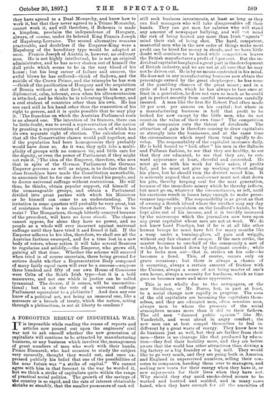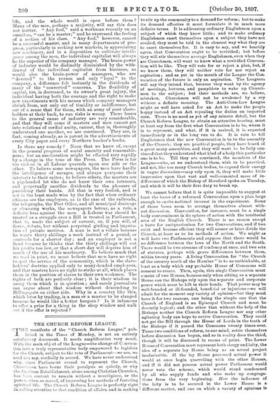A FORGOTTEN RESULT OF INDUSTRIAL WAR.
IT is impossible while reading the reams of reports and articles now poured out upon the engineers' civil war not to ask oneself whether the new generation of capitalists will continue to be attracted by manufacturing business, or any business which involves the management of great numbers of men who work with their hands. Prince Bismarek, who had occasion to study the subject very earnestly, thought they would not, and once ex- pressed publicly his belief that one of the possibilities of the near future was " a strike of capital." We cannot agree with him in that forecast in the way he worded it, but we think a strike of capitalists quite within the range of practical social politics. The growth of the savings of the country is so rapid, and the rate of interest obtainable shrinks so steadily, that the smaller possessors of cash wil still seek business investments, at least as long as they can find managers who will take disagreeables off their hands. They can get men for salaries who will stand any amount of newspaper bullying, and will rot mind the risk of being hooted any more than Irish " agents " mind their risk of being shot. The hard, competent, masterful men who in the new order of things make most profit can be hired for money in shoals, and we have little doubt will continue to be hired while competition leaves the British manufacturer a profit of 5 percent. But the in- dividual capitalisthas played agreat part in the development of British industry, and we are not at all sure that he may not be driven out. He is by no means contented in his mind. He does not in any manufacturing business now obtain the percentage earned by the great shopkeeper; he has none of the gambling chances of the great miner; and in a cycle of bad years, which he has always to face once at least in a generation, he does not earn so much as he could get in perfect security from careful investments carefully insured. A man like the first Sir Robert Peel often made 50 per cent. per annum on his capital; but where in a manufacturing business is half that profit to be looked for now except by the little men, who do not count-in the value of their own time ? The competition of the companies cuts the throat of dividends. The attraction of gain is therefore ceasing to draw capitalists so strongly into the businesses, and at the same time the circumstances which repel them tend rapidly to de- velop. The responsibility of the capitalist increases daily. He is held bound to " look after " his men in the Saltaire and Pullman fashion, to see that they are healthy, to see that they are educated, to see that they are, to out- ward appearance at least, cheerful and contented. He must go on with his work for their sakes, if profits fail, and he must not give up working without selling his place, lest he should ruin the district round him. It is seriously argued that a coal-owner must not shut down his pits, thereby keeping coal for the next generation, because of the immediate misery which he thereby inflicts, but must go on, whatever the circumstances, or sell, until his exertions result in losses large enough to make perse- verance impossible. The responsibility is as great as that of owning a Scotch island where the weather may any day throw half the population on the landlord's hands, to be kept alive out of his income, and it is terribly increased by the microscope which the journalists now turn upon auy great capitalist whose men are not at work. We do not know Lord Penrhyn, but if he is at all like other human beings he must have felt for many months like a wasp under a burning-glass, all pain and wriggle, without any fair chance of escape. If the men strike, the master becomes to one-half of the community a sort of welsher, to be hunted down by indignant crowds ; while if he locks men out—that is, strikes on his side—he becomes a fiend. This, of course, occurs only on grave occasions; but there is always a chance of it occurring, always a certain amount of friction with the Unions, always a sense of not being master of one's own house, always a necessity for hardness, which as time goes on becomes more and more oppressive.
This is not wholly due to the newspapers, or the new Socialism, or Mr. Burns, but, in part at least, to a. social change now rapidly in progress. The sons of the old capitalists are becoming the capitalists them- selves, and they are educated men, often sensitive men, always men to whom the pressure of the social atmosphere means more than it did to their fathers. The old men " damned public opinion " like Mr. Vanderbilt, and went ahead in angry comfort ; the new men can at best compel themselves to feel in- different by a great waste of energy. They know how to do business just as well, but they are farther from their men—there is no cleavage like that produced by educa- tion—they feel their hostility more, and they are better aware that the world has other attractions than driving a big factory or a big foundry or a big mill. They would like to go very much, and they are going both in America and England in unperceived numbers, selling their con- cerns to companies, handing them over to managers, and seeking new vents for their energy when they have it, or new enjoyments for their lives when they have not. Why should they stay amid smoke-dried scenes to be worked and hurried and scolded, and in many cases hated, when they have enough for all the amenities of life, and ' the whole world is open before them ? 'Many of the men, perhaps a majority, will say this does not matter. " Any fool," said a workman recently on an omnibus, " can be a master;" and he expressed the feeling of a section of his class. "Any fool," however, cannot be a successful master, and in many departments of pro- gress, particularly in seeking new markets, in appreciating new machinery, and in a disposition to cultivate intelli- gence among the men, the individual capitalist will always be the superior of the company manager. The brain-power of industry would be distinctly diminished by the with- drawal of the individual capitalist from business, as would also the brain-power of managers, who are -" devoted" to the person and only " loyal" to the company, a difference felt instantly in the dividends of many of the "converted" concerns. The flexibility of capital, toe, is decreased, to its owner's great injury, the individual having both the courage and the right to make new experiments with his means which company managers shrink from, not only out of timidity or indifference, but out of a sense that for them, with an army of poor share- holders at their back, to run risks is wrong. These losses to the general cause of industry are very considerable, and that they will come if masters and men cannot get into relations of cordial amity, cannot, that is, thoroughly understand one another, we are convinced. They are, in fact, coming already, as is patent in the advertisements of every City paper and every Northern banker's books.
Is there any remedy ? None that we know of, except in the general progress of social amenity and reasonable- ness; but an amelioration might be effected very rapidly by a change in the tone of the Press. The Press is far -too violent in all Labour quarrels upon one side or the other. To believe some newspapers, the men have hardly the intelligence of savages, and always postpone their interests to their spites; to believe others, the masters are a pig-headed lot who do not know their own interests, and perpetually sacrifice dividends to the pleasure of punishing their hands. All that is very foolish, and is not in the least made wise by the fact that when ordinary citizens are the employers, as in the case of the railroads, the telegraphs, the Post Office, and all municipal drainage or cleansing works, the newspapers betray, as a rule, a definite bias against the men. A L3,bour war should be treated as a struggle over a Bill is treated in Parliament, that is, made the subject of earnest, or, if you will, of fierce, debate, but without perpetual girding and imputa- tion cf private motives. A man is not a villain because he wants thirty shillings a week instead of a pound, or contends for a shorter day ; and an employer is not a fiend because he thinks that the thirty shillings will cut his profits too low, or that a short day will deprive him of much of the use of his machinery. To believe much that we read in print, we must believe that men have no right to quit the service of the community, which is the slave- holders' doctrine applied only to many-headed employers, and that masters have no right to strike at all, which places them in the position of slaves to their own workmen. The rights of both are perfectly clear ; it is their wisdom in using them which is in question ; and surely journalists can argue about that wisdom without descending to Billingsgate on either side. Why in a country like this, which lives by trading, is a man or a master to be slanged because he would like a better bargain ? Is it infamous to offer a price for a thing in the shop window and walk 'int if the offer is rejected ?







































 Previous page
Previous page